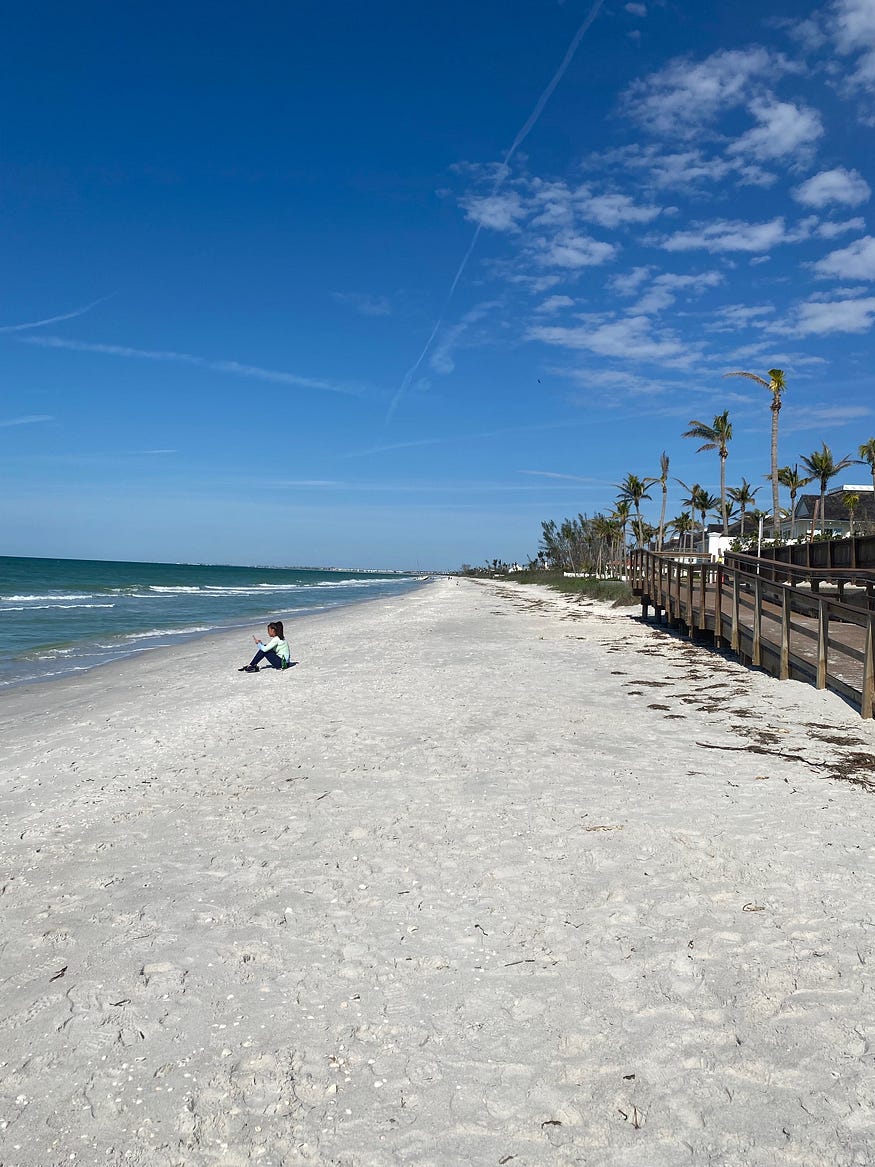Research shows: yes, 120 minutes a week in nature benefits many aspects of health
As humans, we can function in nearly any environment. People are so adaptable that some people, about a thousand, live year-round in Antarctica. Antarctic winters are so cold and dark that scientists are confined to their research stations for months.

The fact that humans can survive living inside for months without ever seeing the sun doesn’t mean that staying inside all the time is healthy or good for us.
When I was young, we had a family tradition that dated back to the 1930s and Friday taco nights when my mother and aunt were young. After dinner, they would go in the back yard and “run around the bird bath.”
Thereafter, following any family meal, our family tradition became cleaning the table and going to “run around the bird bath” — taking a short walk. It turns out that this simple habit has been proven to help everyone to moderate blood sugar spikes after a meal.
Spending time in nature is an often-overlooked, but crucial part of wellness.
The kinds of walks we do at our local environmental parks are proven to be beneficial for older adults, children, and everyone in-between. There are many ways that being outside in nature improves health and well-being.
Cognitive Function and Brain Activity
Have you heard of the term “executive functioning?” In psychology, executive functioning refers to the ability of our brain to manage the things we need to handle: setting goals, planning, and getting things done.
There are a few simple tests that can show this type of cognitive ability. One of them is called the Backwards Digit Span (BDS) test. In the BDS test, people are asked to listen to a set of numbers and repeat them backward.
In 2019, University of Chicago, Stockholm University, and University of Michigan researchers analyzed more than ten different controlled research studies comparing student ability to perform the Backwards Digit Span (BDS) test before and after spending at least an hour in nature. On average following time in nature, the students were able to remember two more numbers in the series, a performance increase of about 20%.
What would you be able to accomplish if you were able to be 20% more focused and alert? Especially if you could build those abilities for free while having fun?
Blood Pressure and Cardiovascular Health
Nature is so good for our blood pressure and heart health that some psychologists are even using the term “Forest Therapy” to describe its relaxing effects. A 2018 study of patients at a Louisville, Kentucky heart clinic showed that out of hundreds of patients, the ones who lived in greener areas healed more quickly and had lower blood pressure than the patients who lived in more urban areas lacking trees and grass.
Michelle Kondo, a scientist with the U.S. Forest Service, said, “The physiological response to being outside in nature is real, and it’s measurable.” Measurable benefits after just one hour in nature include lower blood pressure, lower stress hormones like cortisol, lower adrenaline rates, and deeper breathing.
Mental Health
In 2019, researchers from the University of Exeter in the UK studied 20,000 people from throughout Great Britain and Europe. The study showed that if people spent 120 minutes in nature or more each week, they had better psychological health, were happier, and had less anxiety than those who spent less than 120 minutes. The two-hour amount of nature time was a real boundary, according to the research. If people spent less than two hours, they didn’t share the mental health boost the people who spent more time outdoors received.
I look back at the time in my life when I did not spend enough time outdoors. I spent nearly every waking hour working in a glass-walled office or commuting in my car. I was much more depressed and anxious than I am now that I can get outside any time I like and spend much more than two hours a week in the “great outdoors.”
Richard Louv wrote a book called Last Child In the Woods in 2005, and he also created the term “Nature Deficit Disorder.” When he started writing about the benefits of nature, there were no official studies that showed any positive effects. After almost 20 years, Louv says that research now shows that “Nature is not only nice to have, but it’s a have-to-have for physical health and cognitive function.”
Being in nature for at least two hours every week also improves strength and coordination, and it can also help to improve sleep.
You could try taking a one-hour walk in nature and see if you have better sleep that night, compared to a day where you stay inside all the time.
Microbiome
Scientists now recognize that our gut microbiome is an organ like our heart, kidneys or liver. The microbiome plays such an important, complex role to benefit (or harm) our bodies, minds, and even spirit.
Being outdoors helps to build a healthy microbiome. Outside Online tested the microbiomes of a group of elite outdoor athletes and they all had diverse, healthy microbiomes. Some of the ultra long-distance runners had the healthiest microbiomes of all, with many different beneficial “bugs.”
A 2020 study published in Nature looked at the microbiomes of 52 children in an organized nature play program. The children’s microbiomes grew healthier and more diverse after two months in the program. They also became much happier and had fewer stress hormones.
It’s a little unpleasant, but the researchers studied the level of serotonin in the children’s poop: they had more after being in nature and less before playing outside. These differences showed in their behavior. According to the researchers, “Gut microbiota can both produce and modulate the host’s biosynthesis of serotonin.”
In other words, regularly being in nature might help people with depression and anxiety more than prescription pills which are now well-known for losing their effectiveness over time.
Other Ways to Strengthen Health
The many benefits of being in nature made me think of other ways we can benefit our health. I recently took a fun stretch limo trip with about 50 of my friends. Traveling with a friendly, happy group is more relaxing and enjoyable than traveling alone.
I wonder what the health cost is of the many people who commute alone for hours as Bruce and I did for many years. To be blunt, I wonder how many years those commuting/70+ hour workweeks took off both of our lives. He donated his happiness and life to Kraft and other Fortune 500 businesses. I donated mine just so I could see one of my hometowns (Los Angeles) build up to 60,000 homeless, miserable people on every street corner.
I know that there’s resistance to public transportation and many areas either have terrible public transportation, like Los Angeles, or have none.
Most people do not want to ride the bus with others whom they perceive as antisocial, dangerous, or otherwise unpleasant and potentially harmful.
But what if — the buses or trains could be clean, fun, and pleasant?
I think that would be good for health and well-being too.
Sources:
Avitt, Andrew. “The wellness benefits of the great outdoors,” U.S. Forest Service, 24 March 2021, url: https://www.fs.usda.gov/features/wellness-benefits-great-outdoors
Davies, Bethan. “Living and working in Antarctica,” AntarcticGlaciers.org, 2 April 2022, url: https://ww.antarcticglaciers.org/antarctica-2/people-in-antarctica/living-and-working/
Halnon, Emily. “How 2 Minutes of Walking After a Meal Can Help Control Blood Sugar Levels,” Health.com, 19 August 2022, url: https://www.health.com/news/walking-after-meal-blood-sugar
Jacobs, Tom. “Being in Nature Makes Your Heart Healthier,” Pacific Standard, 5 December 2018, url: https://psmag.com/environment/being-in-nature-makes-your-heart-healthier
Jimenez, Marcia P., Nicole DeVille, et. al. “Associations Between Nature Exposure and Health: A Review of the Evidence,” International Journal of Environmental Resources and Public Health, 30 April 2021, url: https://www.ncbi.nlm.nih.gov/pmc/articles/PMC8125471/
Kelly, Michelle E., Holly Duff, et. al. “The impact of social activities, social networks, social support and social relationships on the cognitive functioning of healthy older adults: a systematic review,” Systematic Reviews, 19 December 2017, url: https://www.ncbi.nlm.nih.gov/pmc/articles/PMC5735742/#
Robbins, Jim. “Ecopsychology: How Immersion in Nature Benefits Your Health,” Yale Environment 360, 9 January 2020, url: https://e360.yale.edu/features/ecopsychology-how-immersion-in-nature-benefits-your-health
Sobko, Tanja, Suisha Liang et. al. “Impact of outdoor nature-related activities on gut microbiota, fecal serotonin, and perceived stress in preschool children: the Play&Grow randomized controlled trial,” Nature, 15 December 2020, url: https://www.nature.com/articles/s41598-020-78642-2
Stenfors, Cecilia U.D., Stephen C. Van Hedger, et. al. “Positive Effects of Nature on Cognitive Performance Across Multiple Experiments: Test Order but Not Affect Modulates the Cognitive Effects,” Frontiers in Psychology, 3 July 2019, url: https://www.frontiersin.org/articles/10.3389/fpsyg.2019.01413/full

Leave a Reply